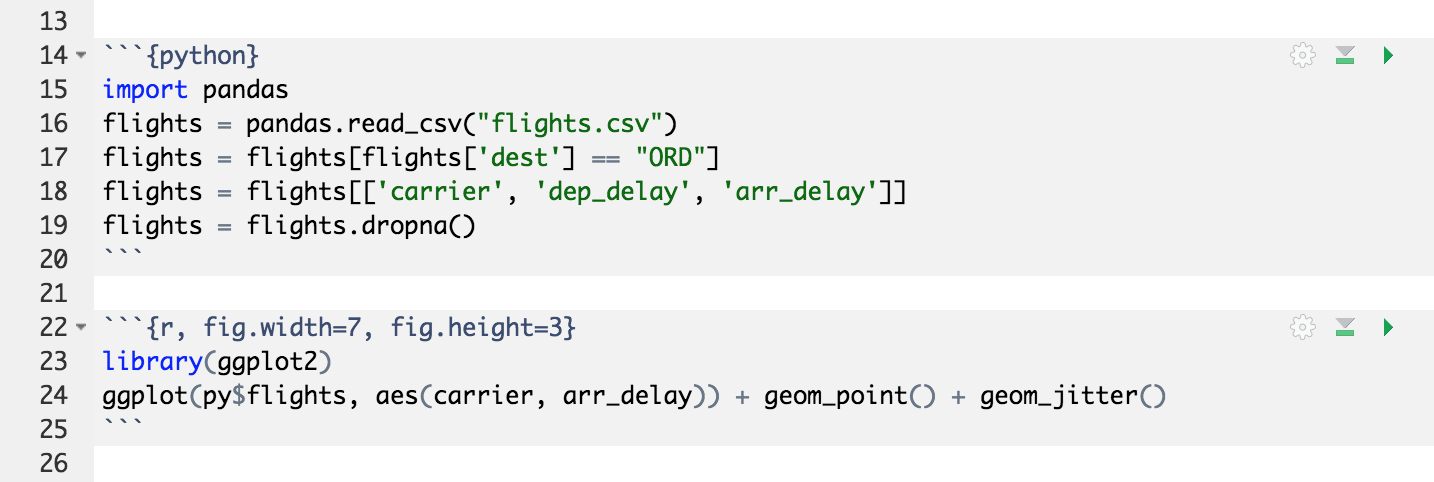Using Python in RMarkdown
- A Computer Science portal for geeks. It contains well written, well thought and well explained computer science and programming articles, quizzes and practice/competitive programming/company.
- Ik heb een python equivalent van de MATLAB commando findchangepts. Ik ben niet in staat om een nog te vinden. In principe wil ik K abrupte veranderingen in mijn tijdreeksen vinden.Ik ben in.
The reticulate package for R provides a bridge between R and Python: it allows R code to call Python functions and load Python packages. You can even use Python code in an RMarkdown document in RStudio. Calling Python code in R is a bit tricky. If I make an R data frame and want to give it to a Python function, how can the Python function manipulate the data frame? I have two lists lista = 'A', 'B', 'E', 'F', 'G' listb = 'A', 'C', 'E', 'F', 'H', 'I' I want to know how I could show all of the values. For instance, SML provides a tabulation tool: tabulate f which produces a sequence f 0f 1The same effect can be achieved in Python. Roughly equivalent.
In order to write blog posts using Python code, I wanted to figure out a way to include Python code chunks in RMarkdowns. When you insert a code chunk in RMarkdown, you have the option of specifying the language of that chunk: the default is R, but you can also insert a Bash, SQL, Python, etc. code chunk.
When I attempted to insert a Python code chunk and import libraries, however, I kept getting the error:
Error in py_run_string_impl(code, local, convert) :ImportError: No module named sklearn.cluster
From running Python in Atom, I knew I had the sklearn.cluster module installed, so the problem must be in the connection between R and Python.
reticulate
The reticulate package in R (website here allows R to interact with Python. I installed the package from RStudio.
Changing Python versions
Installing reticulate still didn’t allow me to knit the RMarkdown with a Python code chunk, however. I followed the instructions in this post by Pablo Franco to check the Python version that reticulate was using:
I ended up with the following output:
Markdown In Python
I wanted to be running Python version 3.6, which was the version I had installed using Anaconda, so I needed to change the path.
Set-up chunk
I discovered that you can set the path to a different installation of Python by modifying the setup chunk at the start of the RMarkdown. According to the bookdown website, the default used is Python 2.
My default version of this set-up chunk looks like this:

You can set the chunk option engine.path to specify the path to the engine interpreter and change it from the default Python 2.
Finding Python path
I now needed to find the actual path to Python that I wanted to use. I did this by opening up Python separately from RStudio (I used Atom for this) and running the following (I got the code for this from here):
From this information, I could tell I wanted to use the path /anaconda3/lib/python3.6, rather than /usr/bin/python, which is what RMarkdown had originally been using. I modified by set-up chunk to look like this:
Other options
This solution enabled me to knit RMarkdowns with Python code chunks! It changes the engine interpreter globally, which you could do for multiple engines simultaneously, like Python and Ruby, for example:
Python Markdown To Html
Alternatively, you can specify the engine interpreter locally in each code chunk by starting the chunk with {python, engine.path = '/anaconda3/bin/python3.6}, for example.
Related
